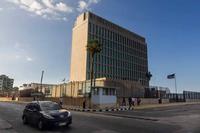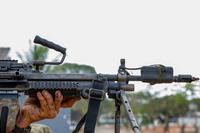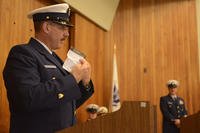F-35 Lightning II program boss Vice Adm. David Venlet is bullish about the prospects for his super-jet, but he argues that he needs time and space to get all the kinks worked out.
Venlet told a defense conference last week that he can fix all those things you've heard about that are wrong with the different flavors of the F-35 -- and some you may not have heard about -- but he must be permitted to get on with it. More delays, restructuring or other changes would just gum up the works. His remarks were quoted in a note circulated Monday by the sponsors of the conference, Credit Suisse and defense consultant Jim McAleese.
Venlet said the F-35 flight test program is running as fast as it can, and of course it's going to find problems -- that's the point. "These are normal teething problems that you always fight in fighter aircraft development," he said, per Credit Suisse's note. "This simply requires good old-fashioned systems engineering, to fix problems as we find them."
The jet's "software issues," which Secretary Panetta has told Congress are his biggest worry? They're working on them, Venlet said -- "We are productionizing software literally as we are still testing it."
The infamous helmet? That's being "addressed," Venlet said; program officials think the "alternate goggles-based system" will work for now as a backup, and Venlet promised he would keep on the helmet situation until he thought it was squared away. F-35 pilots were supposed to get the world's most wham-o-dyne cockpit setup, including a helmet that displayed live video and sensor information, but engineers haven't yet been able to make it work exactly to spec.
The F-35C's tail hook? That's "a damping/bouncing issue that we could not have found before, and have fixes for now," Venlet said.
The F-35B's fuel dump issue? That's "just a matter of systems engineering to re-route fuel venting."
The F-35B's "propulsion reliability of inlet/exhaust doors is understood, and being fixed."
So it's just a matter of doing the work, Venlet said. According to the Credit Suisse report, he also is confident that the international members of Club F-35 will stay in, despite their sometime grumbling -- with Japan as the latest example. DoD's decision to delay 179 fighters in its most recent future years plan will give program officials the time they need to get these jets into good shape, and when that happens, the foreign customers will once again be eager for their orders.
Of course, there's a lot that can go wrong between now and the future. Even Venlet acknowledged "We're not where I want us to be yet" on many key points in the program, and he and other officials also conceded that even if everything goes well, a lot of this is out of their hands. The F-35 has powerful enemies and you could make a case that it's the victim of a perception gap -- borderline or non-defense mainstream audiences only hear about it when it has more problems, which reinforces the perception that it's just a boondoggle. But perceptions are significant, especially when there are hundreds of billions of dollars at stake.
"DoD is clearly concerned that another major performance gaffe could cause Congress to truncate the F-35 program in favor of 'alternatives,'" the Credit Suisse analysts wrote.








